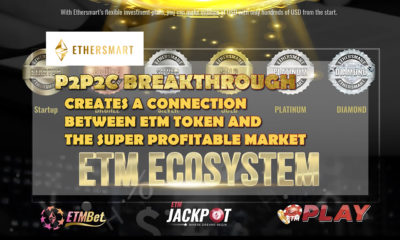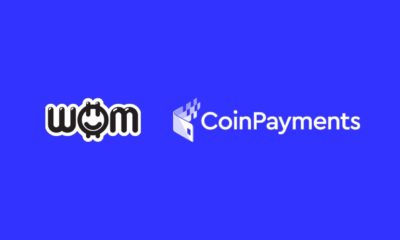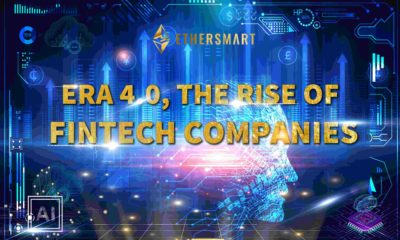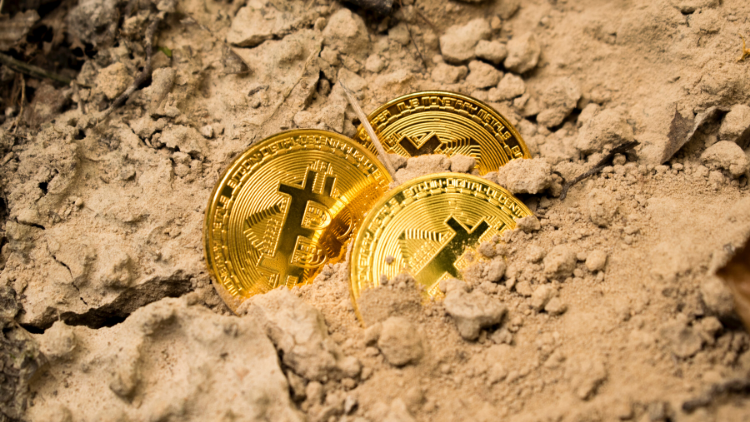Blockchain
Analyzing CoinGecko 2024 Q1 Crypto Industry Report

The CoinGecko 2024 Q1 Crypto Industry Report is a crucial resource for investors and enthusiasts in the cryptocurrency space.
This report provides a comprehensive overview of the market trends, performance metrics, and emerging technologies.
In this analysis, we look at the report’s key findings and discuss how they might affect the market and its players.
Our exploration covers aspects such as market performance, technological advancements, regulatory impacts, investment trends, and future predictions, offering a thorough perspective on the current and potential trajectory of the crypto industry.
Key Findings of CoinGecko 2024 Q1 Crypto Insights
CoinGecko’s 2024 Q1 Crypto Industry Report emphasizes significant growth and developments in the cryptocurrency market.
During the first quarter, the cryptocurrency market peaked, with a total market cap of $2.9 trillion in March. Significant occurrences like the US government’s approval of spot Bitcoin ETFs were to blame for this.
However, by the end of the quarter, the market had stabilized around $2.4 trillion.
Bitcoin and Ethereum led the way, with Bitcoin reaching an all-time high of $73,098 and Ethereum significantly benefiting from its robust staking ecosystem.
Additionally, the report details a surge in interest in meme coins on the Solana network, where the top meme coins achieved substantial market valuations.
Trading volumes on centralized exchanges reached a record high since Q4 2021, totaling $4.29 trillion. Binance remained the dominant exchange, gradually regaining market share over the quarter.
The NFT market also saw significant activity, with $4.7 billion traded across the top 10 marketplaces. Magic Eden stood out by overtaking others in market share during March due to its innovative Diamond reward program and the launch of an Ethereum-based marketplace.
Moreover, the decentralized exchange (DEX) sector experienced a dynamic shift. Due to incentives and growing trader interest in alternative ecosystems, platforms on other chains, such as Arbitrum and Solana, saw a surge in activity, causing Ethereum’s share of DEX trading volume to fall below 40%.
These insights from CoinGecko’s report highlight how the cryptocurrency market is dynamic and changing quickly, offering analysts and investors useful information.
Overview of Market Performance in Coingecko 2024 Q1 Crypto Industry Insights
The first quarter of 2024 was noteworthy for the cryptocurrency market due to significant industry developments. As the report pointed out, the historical acceptance of spot Bitcoin ETFs in the US has significantly increased the total market capitalization of cryptocurrencies.
Bitcoin’s Dominance and Price Surge

Bitcoin continued to assert its dominance, maintaining about 55.65% of the market share. The quarter was particularly significant for Bitcoin, reaching an all-time high price of $73,115 on March 13, 2024. Expectations surrounding the Bitcoin halving event and the approval of new ETFs contributed to this surge. At the time of this analysis, Bitcoin’s price was observed at $67,810.87, showing a decrease of 17% in 48 days.
Ethereum and Altcoins
Ethereum also witnessed considerable growth, benefiting from the expansion of its staking solutions and the broader adoption of its blockchain for various applications. Its price stabilized around $3,300.55, indicating investor confidence in its technology. Altcoins like Cardano and Solana showed varied performances, reflecting ongoing developments and market sentiments.
Trading Volumes on Exchanges
The trading volume on centralized exchanges reached a new high since Q4 2021, with $4.29 trillion recorded in the first quarter. This increase represents a robust recovery and growing interest in cryptocurrency trading. Binance led the market, regaining its position with significant trading activity and new project listings.
NFT Market Insights
The NFT sector remained vibrant, with $4.7 billion in trading volumes across the top marketplaces. Magic Eden gained substantial market share due to its innovative reward programs and the launch of an Ethereum-based marketplace.
Overall, the Q1 2024 period for the crypto market was characterized by a rebound in trading activity, notable price changes, and institutional investments, pointing to a developing and more complex market environment.
Technological Advancements in Crypto
The future of cryptocurrencies is being shaped by significant technological advancements driving their rapid evolution.
Here’s a detailed look at some of the key technological trends from the first quarter of 2024:
1. Layer 2 Solutions and Scalability Enhancements
2024 has seen continued progress in Layer 2 solutions, which are critical for enhancing the scalability of blockchain networks.
Technologies like the Lightning Network are becoming more prominent, offering faster and more cost-effective transactions for Bitcoin and other cryptocurrencies.
2. Increased Adoption of Smart Contract Capabilities
Smart contracts remain a major focus, with Ethereum leading their deployment and utilization. These increasingly sophisticated contracts enable more complex and secure decentralized applications (DApps).
3. Growth of Decentralized Finance (DeFi)
DeFi has been at the forefront of the crypto technological revolution, providing decentralized financial services without the need for traditional financial intermediaries.
4. Developments in Crypto Payments and Integration
Thanks to the creation of more user-friendly payment platforms and big businesses’ growing acceptance of cryptocurrencies, cryptocurrency payments are becoming increasingly integrated into regular commerce. Transactions are now quicker, more secure, and less expensive, thanks to the continuous blockchain technology advances.
5. Advances in Blockchain Interoperability
Efforts to enhance blockchain interoperability have gained traction, with several projects working to enable different blockchain networks to communicate and share information more seamlessly. This interoperability is crucial for the widespread adoption of blockchain technology, as it allows for a more interconnected and efficient ecosystem.
6. Environmental Sustainability in Mining
The crypto mining sector increasingly focuses on sustainability, shifting towards using renewable energy sources and more energy-efficient mining practices. These advancements reflect a dynamic and rapidly evolving field, poised to address previous limitations and unlock new possibilities across various sectors.

Regulatory Environment and Its Impact on the Crypto Market
The regulatory landscape for cryptocurrencies in 2024 Q1 has continued to evolve, significantly impacting market dynamics and investor sentiment.
Here’s an in-depth look at the regulatory changes and their effects on the cryptocurrency ecosystem:
1. Global Regulatory Shifts
In the first quarter of 2024, we witnessed a shift in the global regulatory framework for cryptocurrencies. Countries have increasingly recognized the need for regulation to manage the risks associated with crypto assets while fostering innovation. The approval of spot Bitcoin ETFs in the United States marked a significant regulatory milestone, providing a safer and more regulated vehicle for institutional investors to engage with Bitcoin. This move has legitimized crypto assets and sparked global interest from other regulatory bodies to explore similar approvals.
2. Enhanced Security and Compliance Measures
With increased regulatory scrutiny, crypto exchanges and wallet providers have ramped up their security measures. Enhanced KYC (Know Your Customer) and AML (Anti-Money Laundering) procedures have become more stringent in complying with new regulations. These measures aim to curb the misuse of digital currencies for illicit activities and increase overall market transparency. Although these regulations have imposed additional operational burdens on crypto businesses, they have also led to greater investor confidence and market stability.
3. Impact on DeFi and Innovation
The decentralized finance (DeFi) sector, while offering significant innovations in financial services, has faced challenges due to the unclear regulatory environment. Regulators are particularly concerned about the lack of central oversight, which poses risks to consumer protection. Various jurisdictions have started to outline specific regulations that aim to integrate DeFi operations within the broader financial system, ensuring they adhere to standards similar to those of traditional financial entities.
4. Varied Responses Across Jurisdictions
The regulatory response to cryptocurrencies has varied significantly across different jurisdictions. Some countries have embraced the technology, enacting crypto-friendly laws that facilitate growth and innovation. Others have taken a more cautious approach, implementing restrictive policies that have sometimes stifled local crypto markets and innovation. This disparity in regulatory attitudes has led to a fragmented global market where businesses must navigate complex laws.
5. Future Regulatory Trends
Looking ahead, the trend toward harmonizing global cryptocurrency regulations seems likely. This harmonization aims to reduce the risks associated with crypto transactions while supporting technological advancements. International cooperation and dialogue among regulatory bodies are expected to increase, fostering a more unified approach to crypto regulation that balances risk management with promoting innovation.
The regulatory environment will continue to play a crucial role in shaping the future of the cryptocurrency industry. As regulations mature and become more standardized, they are expected to provide a more stable foundation for the growth of the crypto market.
Investment Trends and Consumer Behavior in the Crypto Market
As a result of several factors, such as regulatory changes, market dynamics, and technological advancements, the cryptocurrency market saw notable shifts in investment trends and consumer behavior during the first quarter of 2024.
Here’s a detailed look at these trends:
Institutional Crypto Investments:
The period saw a substantial increase in institutional investments in cryptocurrencies. This rise is attributed to greater regulatory clarity and the launch of new financial products, such as Bitcoin ETFs, which have made crypto investments more accessible to institutional investors. These entities are actively participating more, increasing overall market liquidity and stability. This shift underscores a growing recognition of cryptocurrencies as a legitimate asset class within traditional investment portfolios.
Retail Investors’ Sentiment
Retail investor sentiment has also evolved with increased education and awareness about the crypto market. The market recovery and stabilization in Q1 2024 helped restore confidence among retail investors, leading to increased participation. Moreover, the proliferation of user-friendly crypto trading platforms has empowered more individuals to engage with the market, boosting retail investment volumes.
Diversification of Crypto Assets
There has been a noticeable trend towards diversification within cryptocurrency investments. Investors no longer focus solely on major cryptocurrencies like Bitcoin and Ethereum but are also exploring other altcoins and tokens. This diversification drives the desire to spread risk across various assets and pursue higher returns. Introducing thematic and sector-specific tokens has further facilitated this trend, allowing investors to tailor their crypto portfolios strategically.
Consumer Adoption of Cryptocurrency Payments
The adoption of cryptocurrency for everyday transactions has seen gradual growth. Thanks to advancements in payment technologies and infrastructure, many merchants and businesses are now accepting cryptocurrency payments. With the help of integrated payment solutions and mobile apps that serve a global user base, the ease of completing cryptocurrency transactions has greatly increased.
Impact of Macro-Economic Factors
Macroeconomic factors, including inflation rates and geopolitical tensions, have continued influencing crypto markets. In times of economic uncertainty, cryptocurrencies have increasingly been considered alternative investments. Since cryptocurrencies are decentralized, they safeguard against possible market disruptions by conventional economic factors, supporting this perception.
These trends from the first quarter of 2024 reflect a maturing market increasingly integrated with the broader financial landscape. As the market evolves, these trends are expected to deepen, with potential long-term implications for the global economic system.
Predictions and Future Outlook for the Crypto Market

Based on the trends and developments observed in the first quarter of 2024, as detailed in the CoinGecko 2024 Q1 Crypto Industry Report, several predictions and future outlooks can be delineated for the cryptocurrency market.
These insights provide a perspective on what could be expected in the upcoming quarters and beyond.
Continued Institutional Engagement
Institutional engagement is predicted to continue its upward trajectory. With regulatory environments stabilizing and becoming more crypto-friendly, many financial institutions are expected to enter the crypto market.
As a result, the market will become more stable, and more advanced cryptocurrency financial products may be developed.
Growth in Decentralized Finance (DeFi)
The DeFi sector is expected to maintain its growth momentum. Innovations in blockchain technology and smart contract applications will likely drive further adoption of DeFi services.
This sector could see an expansion in services and products that mimic traditional financial offerings but with the added benefits of decentralization, such as improved access and reduced costs.
Technological Innovations and Blockchain Integration
Advancements in blockchain technology are anticipated to continue at a rapid pace. These innovations may further enhance scalability and interoperability between different blockchain platforms.
Such developments could facilitate a wider adoption of blockchain technology in sectors beyond finance, including healthcare, supply chain management, and governance.
Rise of Non-Fungible Tokens (NFTs)
The NFT market is anticipated to change substantially, expanding beyond collectibles and art to digital identity, real estate, and intellectual property.
Technological developments that enhance the functionality and integration of NFTs into routine online activities will probably facilitate this evolution.
Regulatory Developments
Regulatory clarity is anticipated to improve, which could lead to a more standardized approach to crypto regulation globally.
Retail and institutional investors should expect a safer investment environment because of this, which will lessen the current market fragmentation.
Consumer Adoption and Mainstream Acceptance
Consumer adoption is expected to increase as cryptocurrencies are integrated into payment systems and financial services.
The continuous advancements in security protocols and user interfaces may reinforce this, solidifying cryptocurrencies’ position as a crucial component of digital finance.
Geopolitical Influences
The global financial landscape will continue to impact the cryptocurrency market due to economic policies and geopolitical tensions. Cryptocurrencies may increasingly be considered alternative assets during fiat currency devaluation or economic instability.
These predictions suggest a dynamic and evolving crypto market with numerous opportunities for investors and consumers. As always, the pace and nature of these developments will depend on a complex interplay of technological, regulatory, and market factors.
Conclusion and Summary of the 2024 Q1 Crypto Industry Report by CoinGecko
According to CoinGecko’s in-depth analysis, the first quarter of 2024 was characterized by significant advancements and ongoing expansion in several cryptocurrency market categories.
Here’s a summary of the key points and insights drawn from the analysis:
Institutional Adoption: Thanks to the introduction of cutting-edge financial products like Bitcoin ETFs and increased regulatory clarity, the crypto market has witnessed increased institutional engagement. This trend is anticipated to continue, giving the market greater stability and maturity.
Technological Advancements: Technological progress in blockchain technology, including Layer 2 solutions and smart contracts, drives the market forward. Along with improving transaction efficiency and capabilities, these advancements are expanding blockchain’s use cases into new industries.
Decentralized Finance (DeFi): DeFi continues to be a major growth area within the crypto space, with an expanding range of services that offer decentralized alternatives to traditional financial systems. The more accessible and user-friendly this industry becomes, the more users it is expected to draw in.
NFTs: Non-Fungible Tokens (NFTs) are evolving past their initial use in arts and collectibles, venturing into areas like intellectual property and digital identity. Technological developments that provide NFTs with additional functionality are supporting this shift.
Regulatory Landscape: The regulatory environment for cryptocurrencies is improving, which is expected to foster a safer and more robust investment climate. A more harmonized global regulatory framework could emerge, reducing market fragmentation and enhancing investor protection.
Consumer Adoption: As cryptocurrencies gain integration into payment systems and financial services, mainstream consumer adoption is expected to rise. Digital currencies will become essential to the larger economic landscape due to continuous advancements in user interfaces and security measures.
Global Economic Conditions: Geopolitical unrest and macroeconomic policies impact the worldwide economy and cryptocurrencies. They are becoming increasingly valued as alternative assets in unstable economic times.
The insights from CoinGecko’s 2024 Q1 report underscore a dynamic and maturing market with promising prospects for the future.
Stakeholders, from investors to everyday users, will benefit from staying informed and adaptive to these evolving trends.
Read the full Coingecko report here:
Blockchain
Seattle Seawolves Join Forces With BlockDAG in Strategic Web3 Sports Partnership

BlockDAG’s explosive rise in 2025 has not only turned heads in the crypto community but is now making waves in U.S. professional sports. The latest proof? A landmark partnership with one of Major League Rugby’s most iconic franchises, the Seattle Seawolves. As of July, BlockDAG has been named the Official Blockchain Partner of the Seawolves for the 2025 MLR season, marking a strategic fusion between Web3 innovation and traditional sports engagement.
Founded in 2017, the Seattle Seawolves are two-time MLR champions and one of the league’s founding franchises. Known for their loyal fanbase and consistent performance, they represent grit, discipline, and championship pedigree, qualities that align closely with BlockDAG’s mission to redefine infrastructure and community in the crypto world.
But this partnership is more than a logo swap or press release. It signals a new chapter in sports engagement, where blockchain isn’t just a back-end tool, but a front-facing feature for fans to own, engage, and participate in the team they love.
Fan Engagement Goes Web3
One of the core features of the BlockDAG-Seawolves partnership is the rollout of blockchain-backed digital assets, including NFTs and fan tokens. These tools are designed not just as collectibles, but as gateways to interactive experiences.
Through these assets, fans will be able to own tradable digital memorabilia, vote in exclusive polls, and unlock premium content. Whether it’s owning a match-winning try as an NFT or using tokens to access special live Q&As with players, the Seawolves community now has direct, blockchain-powered access to the team in ways never before possible.
Nicolaas van den Bergh, Chief Marketing Officer at BlockDAG, noted:
“This partnership will enable us to redefine fan experiences, fostering deeper connections built on trust, creativity, and interactive digital engagement.”
Monthly Content Series & Behind-the-Scenes Access
In addition to digital assets, the collaboration will feature a co-branded monthly content series hosted on the Seawolves’ official social channels. These segments will include match highlights, fan predictions, special interviews, and interactive polls, all designed to strengthen community ties and build a richer digital ecosystem around the team.
Moreover, player-led content will offer behind-the-scenes storytelling that brings fans into the locker room, training sessions, and match-day rituals. These aren’t generic promos, they’re personalized narratives that deepen the emotional connection between fans and the athletes.
This strategy fits seamlessly into BlockDAG’s broader brand philosophy: decentralization is about more than technology, it’s about participation, transparency, and community control.
Shared Values: Innovation, Ownership, and Trust
Shane Skinner, CEO of the Seattle Seawolves, expressed excitement about the partnership:
“We are thrilled to partner with a leading blockchain innovator like BlockDAG to deliver immersive, digital-first experiences to our passionate fanbase.”
That sentiment cuts to the heart of why this partnership matters. The Seawolves aren’t just adopting blockchain for novelty, they’re betting on it to evolve their fan experience and build stronger loyalty in a digital world.
BlockDAG, for its part, sees sports as a powerful onboarding ramp. With over 200,000 BDAG holders and a presale that has surpassed $326 million, the platform is now expanding from pure infrastructure and testnet scaling to cultural presence and brand trust.
The Seawolves partnership is one of two major sports collaborations BlockDAG announced in July, alongside the Seattle Orcas in Major League Cricket. Together, they reflect a strategy to reach broader demographics, from North American rugby fans to cricket’s 2.5 billion-strong global audience.
Conclusion
The BlockDAG-Seawolves deal is not a one-off announcement, it’s a signal of where Web3 is headed. Sports are emotional. Sports are communal. And now, thanks to platforms like BlockDAG, sports can be programmable, ownable, and trustless too.
As BlockDAG approaches its August 11 GLOBAL LAUNCH release and continues selling BDAG tokens at the fixed $0.0016 price, its expanding partnerships show a project no longer content with crypto-native growth. It’s moving into the real world, starting with stadiums, athletes, and everyday fans.
For Seawolves supporters, this is the start of something new. For the rest of the crypto world, it’s a loud and clear message: BlockDAG isn’t just building a chain. It’s building culture.
Presale: https://purchase.blockdag.network
Website: https://blockdag.network
Telegram: https://t.me/blockDAGnetworkOfficial
Discord: https://discord.gg/Q7BxghMVyu
Blockchain
4 Top Crypto Projects in 2025 with Real-World Utility: BlockDAG, Aave, Hedera, & Filecoin!

The market often brings sudden rises, and with 2025 approaching, people are looking at top crypto projects in 2025 that might bring solid gains instead of fading fast. Picking strong coins can be hard, but it saves time and worry. If you want coins backed by real plans and tech, these picks will help.
These include BlockDAG’s system upgrades, Aave’s reliable DeFi features, Hedera’s fast and green tech, and Filecoin’s solid storage solutions. Each of these could lead to top crypto projects in 2025. Below explains why they should be on your watchlist.
- BlockDAG: Building Growth With Real-World Connections
BlockDAG focuses on doing real work rather than empty talk. The presale has already raised over $329 million out of its $600 million target, showing strong market trust. The funds are being used for plans like more than the upcoming exchange listings, US-based sponsorship, and rewards to keep developers and users active and motivated.
The team is working on a system combining Proof-of-Work with DAG for fast transactions and later use in decentralised physical infrastructure and AI systems. A key reason it’s among the top crypto projects in 2025 is how it spends funds to build real use. Its 100M BDAG airdrop rewards those who join tasks like testing, referrals, social posts, and presale.
BlockDAG’s GLOBAL LAUNCH release now offers the $0.0016 rate till August 11th. Early buyers have already seen 2,660% growth in their funds since batch 1. With its $0.05 launch price, there is potential for up to 3,025% ROI for those who buy before August 11. Having passed CertiK and Halborn audits, with major exchange listings planned, and 2 million mobile miners already active, BlockDAG (BDAG) seems set to remain among the top crypto projects in 2025.
- Aave: Leading the DeFi Space With Strong Features
Aave is trusted in decentralised finance as it helps people lend, borrow, and earn interest without using middlemen. Useful features like flash loans, fixed rates, and cross-chain support make it reliable, keeping Aave among the top crypto projects in 2025.
The V3 update brought faster, safer, and cheaper services. Its price bounced from $220 support, rising over 10%, now staying above $260. Analysts say with increasing loans and strong demand, Aave may keep growing this year and stay a leading name among top crypto projects in 2025.
- Hedera: Fast, Low-Cost, and Ready to Scale
Hedera (HBAR) uses Hashgraph for very quick transactions with low fees. This helps in digital IDs, micropayments, and supply chains. With support from global companies, many see Hedera as one of the top crypto projects in 2025.
Currently trading at $0.1428, it showed quiet moves last month but seems to be picking up. Its Hedera CLI tool helps developers build apps faster. As company use increases, experts believe HBAR’s price could rise steadily, making it important in top crypto projects in 2025.
- Filecoin: Supporting Web3 With Strong Storage Tools
Filecoin (FIL) answers the need for safe, decentralised storage for Web3 users. People and businesses store data safely without any one group controlling it. As more people turn to decentralised storage, Filecoin keeps adding partners and users, keeping it on the list of top crypto projects in 2025.
Working with IPFS, Filecoin handles big jobs like video libraries and data storage. Price watchers eye the $2.30-$2.50 zone for a breakout, and if demand stays high, some believe it could move towards $7 in the long term.
Final Takeaway!
Looking towards 2025, choosing projects with real features rather than big words is key. Aave provides trusted DeFi tools, Hedera ensures fast and low-cost transfers, and Filecoin gives strong storage support.

Yet BlockDAG stands out with solid funding, a real-world utility focus, and ambitious infrastructure plans. Its current presale offer, available at $0.0016 until August 11 through the BDAG GLOBAL LAUNCH release, positions it as one of the top crypto projects in 2025. With a confirmed launch price of $0.05, BlockDAG combines strong growth potential with a unique mining and ecosystem strategy that continues to attract serious attention.
Blockchain
Could BlockDAG Reach $1? Whales Move In as 2025’s Top Crypto Presale Breaks Records

BlockDAG is fast becoming one of the standout stories in the crypto space this year. With more than $327 million raised, over 23.5 billion BDAG coins distributed, and an ecosystem already supported by a community of 2 million-plus mobile miners, BlockDAG is proving it’s more than just hype.
It’s now gaining recognition as a Layer 1 platform with actual momentum behind it. The major question many analysts are asking now: Can BDAG hit the $1 mark in the coming years?
With a presale entry price as low as $0.0016 available until the BlockDAG GLOBAL LAUNCH release on August 11, and signs of increasing activity from high-value wallets, BlockDAG’s rapid growth is drawing serious attention. If these early signals prove accurate, BlockDAG could be one of the top crypto presale that transition successfully into long-term market relevance.
Whale Wallets Are Moving, and It’s Creating a Buzz
One of the clearest signs of serious traction in a crypto project is when high-volume wallets begin to act, and that’s exactly what’s happening with BDAG.
Current on-chain data shows several wallets acquiring BDAG in amounts ranging from 7 to 8 figures, all through the limited-time $0.0016 pricing window before August 11. These aren’t casual buys. The scale suggests participation from large holders, potentially including institutional players and crypto whales, who are taking advantage of the pricing before the official launch value of $0.05 kicks in.
Such movements typically happen before major market shifts. These wallets appear to be aligning with the project’s upcoming roadmap, which includes community-run nodes and a full suite of decentralized apps with Ethereum Virtual Machine compatibility.
How BlockDAG Achieved a $327M Raise and Why It’s Significant
Unlike many projects that rely on funding from venture capital, BlockDAG has reached $327 million entirely through public participation. This sets it apart not just for 2025, but across crypto history, putting it ahead of even the most well-known presale successes:
- Filecoin brought in $233 million in 2017
- Polkadot raised $145 million
- Ethereum’s launch in 2014 generated around $18 million
BlockDAG has already outpaced all of these, even before going live.
This level of funding shows two things:
- Widespread belief in the long-term viability of the project
- A strong financial base to support ecosystem development and growth
For those watching this closely, the implications are huge. BlockDAG is stepping into the open market not just with promises but with an active product base. This includes tools like the X1 Miner App, ASIC hardware integration, and a no-code smart contract creator already in use.
Could BDAG Really Hit $1? Here’s What the Numbers Say
Consider these examples: Kaspa crossed $4 billion market cap in 2023. Avalanche exceeded $15 billion during a bullish cycle. Even meme-based coins like PEPE reached multi-billion valuations despite lacking strong utility.
BlockDAG, in contrast, already delivers real substance. It operates a functioning testnet with active smart contract support and runs on a hybrid DAG and Proof-of-Work model capable of handling 15,000 transactions per second. Over 18,250 mining rigs have been sold, reflecting solid hardware demand. Its code is audited, certified, and ready for decentralized app deployment. The roadmap also includes a developer academy, a DeFi launchpad, and a cross-chain bridge, all designed to expand utility and ecosystem depth.
This isn’t about potential; it’s already a working Layer 1 platform. If even a modest share of its 2 million mobile miners begin using the mainnet, the $1 target shifts from speculation to a strategic milestone.
Right now, BlockDAG is offering a limited-time pricing option at $0.0016, even though Batch 29 is at $0.0276. With smart reward structures that encourage long-term holding, the project is building strong liquidity and a self-reinforcing price model as adoption grows.
Ecosystem Strength and Market Visibility Are Driving Growth
BlockDAG’s success isn’t just about the presale. Several key developments are boosting its visibility and utility:
- 20 centralized exchange listings are confirmed
- A 100 million BDAG airdrop tied to presale activity, referrals, testnet usage, and social engagement
- A potential U.S.-based sponsorship to build mainstream awareness
This shows a focus on sustainable growth rather than flash marketing. When branding, liquidity, and user activity align, strong price movement often follows.
Real Utility Meets Real Demand: A Project with Purpose
BlockDAG is not just another promise in a whitepaper. With $327 million raised, strong early participation from large holders, and tools already being used by the public, it has the structure needed to rise fast as one of the top crypto presale projects.
BDAG may well become one of the few coins that bridges true utility with wide-scale community adoption. The push toward a top-50 market position may not be far off if growth continues.
Right now, the special $0.0016 window is still open until August 11. Once it closes, the next price shift may come not from another presale round, but from entry into the open market.
Presale: https://purchase.blockdag.network
Website: https://blockdag.network
Telegram: https://t.me/blockDAGnetworkOfficial
Discord: https://discord.gg/Q7BxghMVyu
-

 Crypto3 years ago
Crypto3 years agoCardalonia Aiming To Become The Biggest Metaverse Project On Cardano
-

 Press Release5 years ago
Press Release5 years agoP2P2C BREAKTHROUGH CREATES A CONNECTION BETWEEN ETM TOKEN AND THE SUPER PROFITABLE MARKET
-

 Blockchain5 years ago
Blockchain5 years agoWOM Protocol partners with CoinPayments, the world’s largest cryptocurrency payments processor
-

 Press Release5 years ago
Press Release5 years agoETHERSMART DEVELOPER’S VISION MADE FINTECH COMPANY BECOME DUBAI’S TOP DIGITAL BANK
-

 Press Release4 years ago
Press Release4 years agoProject Quantum – Decentralised AAA Gaming
-

 Blockchain5 years ago
Blockchain5 years agoWOM Protocol Recommended by Premier Crypto Analyst as only full featured project for August
-

 Press Release5 years ago
Press Release5 years agoETHERSMART DEVELOPER’S VISION MADE FINTECH COMPANY BECOME DUBAI’S TOP DIGITAL BANK
-

 Blockchain5 years ago
Blockchain5 years ago1.5 Times More Bitcoin is purchased by Grayscale Than Daily Mined Coins






